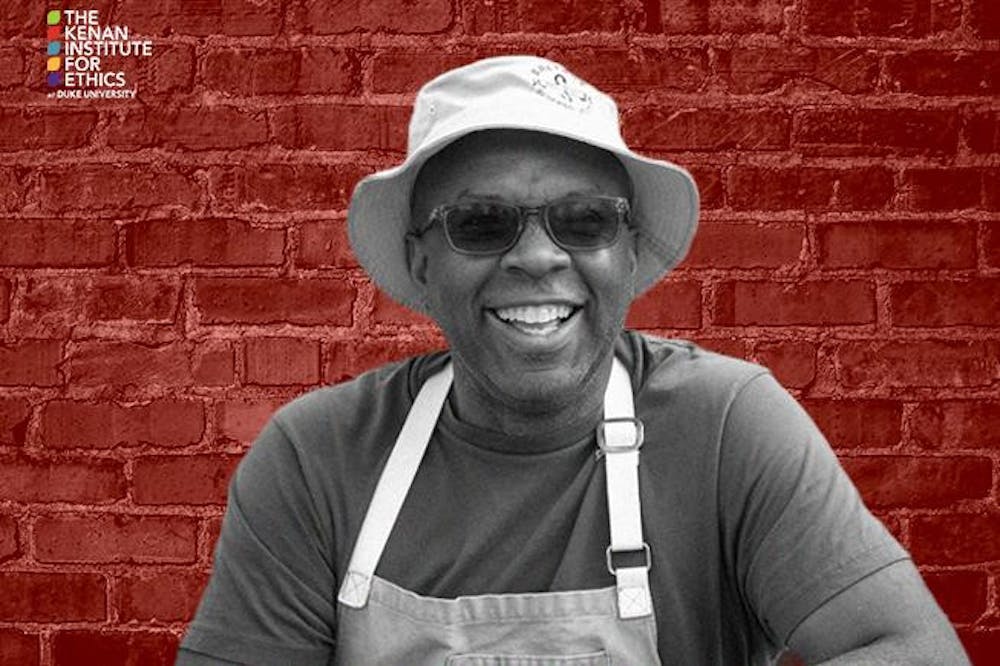“The Ethics of Now”, a long-running program presented by Duke’s Kenan Institute for Ethics, brings speakers from outside the university into conversations with Duke historian and Professor Adriane Lentz-Smith. In each conversation, the speakers discuss topics that touch upon ethical challenges and are of interest to both the Duke and the Durham community. Lentz-Smith has been hosting these conversations for around four years, reflecting on the fact that the name “The Ethics of Now” points to the nature of these conversations — they are essentially concerned with how we live our lives in the contemporary world. Such conversations, Lentz-Smith said, also help give Duke students an idea of how to engage in thoughtful conversations beyond the classroom. Guest speakers of past “Ethics of Now” events include the likes of Min Jin Lee, the author of novel “Pachinko,” and Michael Schur, Emmy Award-winning creator of television show “The Good Place.”
On Nov. 7, Lentz-Smith sat down with Ricky Moore, owner and chef of Durham’s Saltbox Seafood Joint, to engage in a conversation on “Food as Care.”
Moore won Best Chef: Southeast in the prestigious James Beard Foundation Award in 2022. He has had a variety of culinary experiences around the globe, including in Paris, New York City, Toronto and Singapore. Drawing on his own early influences in food and experiences as both chef and restaurateur, Moore and Lentz-Smith talked about how food can be a source of nurture and care.
Lentz-Smith began with a simple and straightforward question: “Why does it matter what we eat?” Moore began by telling the audience what food meant to him.
“For me, food is life. Food is love. Food heals. Food sustains. Food is delicious, based on who makes it. Food is history. Food is a sense of place. Food helps you move through trauma. Sometimes food is trauma. So what matters is that we use it in the way that we need to.”
“Food has been my DNA. I’m originally from Eastern North Carolina. Craven County, New Bern, North Carolina. Growing up, I had many cooks in my family and I just had a lot of good memories sitting around eating. If [food] comes from a place of care and love, I think it's a meaningful thing. It is a very emotional connection. There’s a feeling that you get when someone prepares a dish for you and you can feel the goodness.”
“I always say that even from a professional standpoint [to] my employees: we cannot produce food if you're in an angry [mood]. If you have some instability or you don't feel good, then what you are preparing is going to translate.”
Building on Moore’s recount about his influential early experience with food in his Eastern North Carolina hometown, Lentz-Smith then asked a series of questions that acknowledged his culinary experiences around the world: “Saltbox in some ways continually [referenced your roots]. But you lived all over the world. You cooked all over the world. So, how do you interpolate? How do you pull from your roots? What’s the conversation between where you began and where you’ve gone?”
Moore said, “For me, the one way to get to know a culture is to [...] show respect for it. To figure out what we should be doing and how we should do it – learn why [people of a different culture] do what they do.”
He then mentioned a turning point in his life, where he realized he wanted to be a chef.
“I went through a lot of travel when I was in the military. I was a cook in the military. That was an ‘Aha!’ moment. That was a time where I said, ‘You know what? This is what I want to do as a profession.’ It appealed to my inner need — my creativity.”
He drew upon memories of his grandmother preparing food for him as a child in the military, where he came to understand that delicious food is a morale booster for soldiers, who are in “an environment where is sometimes ungodly.”
“I learned a lot about hospitality [there],” Moore said. “So I carried that with me as I left the military — what it means to provide service, take care of people, like my elders took care of us. And there is a terminology in the professional realm, a French word called ‘soigner’. Loosely translated, it means ‘to do with care,’ ‘to do with love.’ To nurture. A lot of times when I think about cooking, I think of ‘soigner‘ – take care of who you are cooking for.”
Wrapping up the conversation, Lentz-Smith then asked two questions that zoomed in on two specific food stories — one about mullets, a distinct North Carolinian seafish and the other about fried catfish with spaghetti, a southern Chicago dish.
The conversation ended on a delicious question in the audience Q&A section.
In response to the question “What kind of food do you make for yourself to show yourself some love?” Moore said, “I like foie gras. I like truffles. I like meatloaf. An Eastern North Carolina [...] whole hog cooked to perfection, with the crackling nice and crispy and the fat rendered out nicely. And in the acid and vinegar and a little bit of salt. Everything come together real good and everything is buttery. That’s love for me.”
Get The Chronicle straight to your inbox
Signup for our weekly newsletter. Cancel at any time.
Katherine Zhong is a Trinity junior and local arts editor of The Chronicle's 119th volume.

